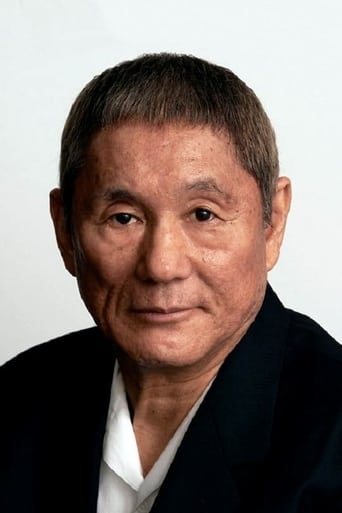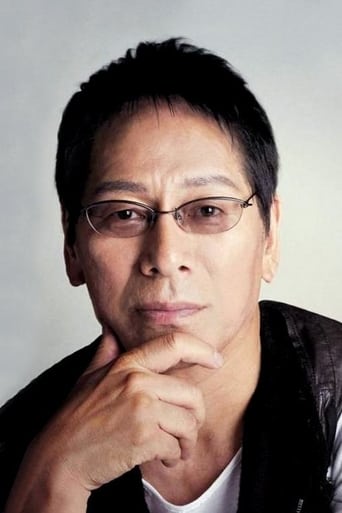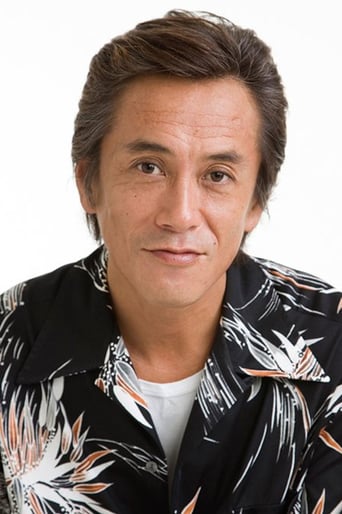Redwarmin
This movie is the proof that the world is becoming a sick and dumb place
Actuakers
One of my all time favorites.
MoPoshy
Absolutely brilliant
Geraldine
The story, direction, characters, and writing/dialogue is akin to taking a tranquilizer shot to the neck, but everything else was so well done.
Yashua Kimbrough (jimniexperience)
Highly Poetic Film .. Arthouse cinema Story follows an ex-cop suffering from severe losses wanting to spend his remaining days with his dying wife - enjoying each other's company before her terminal illness claims her life .Story flashes back to a botched investigation that leads to a shooting leaving one partner dead and the other permanently crippled . His crippled partner decides to spend his remaining days as a painter , and Kitano takes a family vacation with his wife with stolen bank money and travels the mountain-sideVery beautiful movie ,, 9/10
Takeshi-K
Kitano Takeshi is known for relatively slow moving films with brief flashes of sudden extreme violence. This movie was his seventh directorial effort, but fourth crime film continuing a style he began with Violent Cop (1989), Boiling Point (1990) and Sonatine (1993).His style is unique in that it differs from most American and even Japanese crime films, that tend to build to a violent climax. While he did that in Brother (2000), his early films tend to structure things differently. They don't focus on why the violence occurs nor its build up, but choose to follow its aftermath and the how the repercussions effect its victims and those connected to the victims.For those interested in his work, I suggest starting with either Brother, Violent Cop or Boiling Point to ease you into the unique plotting and pace of Takeshi's crime films.
Deigues
Takeshi Kitano dives once more into the yakuza underworld and emerges with a fierce performance, as he leads one of the decade's best hidden gems.Kitano plays Nishi, a cop whose life has been slowly crumbling apart and is about to take an even darker turn. He's lost his daughter and his wife is fighting an uphill battle with leukemia. She spends her days at the hospital and, to pay for her treatment, Nishi now finds himself in debt with the yakuza. To add insult to injury, he's also feeling guilty, as his partner, Horibe, has been confined to a wheelchair after being injured while Nishi was visiting his wife. It's here that the film parts into two narratives: that of Horibe, who must grapple with his new condition, and of Nishi, who has to repay the yakuza and deal with his wife's inevitable demise.Make no mistake, this isn't an Asian action movie. The film has a very deliberate pace. Kitano often shoots long and almost silent takes, showing us a cold and deadpan Nishi, always hidden behind his shades, even when he's with his wife. In fact, the two barely talk throughout the film, but they're truthful, as if they've been together long enough to tell each other all they had to tell. Sometimes they giggle, or share a more heartwarming moment, but these moments are fleeting. It's in between these long takes that we get another look at Nishi. With flawless editing, Kitano makes violence spark in "Fireworks", but that's all it does. Rarely does he linger in the violence or the gore, the act itself is nothing more than that, an action.Both Horibe and Nishi are men to whom life has been treacherous, and yet it's curious to note the distinct way in which these two men react. Horibe is the more vocal of the two, but still seems better at handling his misfortune than the explosive and criminal Nishi. Truth be told, the only pleasant moments in Nishi's life seem to be the ones he spends with his wife, walking by the shore or sitting by the beach, he's calm. However, if he's confronted by his own immoral actions, mayhem ensues. This is mostly how "Fireworks" plays, like a ticking time-bomb, serene but with the threat of violence always at the surface."The flame that burns twice as bright burns half as long" - we know that eventually Nishi will get his comeuppance, but whether he truly deserves it is what's most unsettling about "Fireworks".
badtothebono
So, it has come to this. In the top-rated comment on this flick, somebody says "Nishi is an honorable man". Really? This is a guy who mainly kills and maims people in the movie. He takes a short break to rob a bank. Honorable? How would you like your kids to go to school with the kids of someone who calls that honorable? Wait, there's more! The person also says "we can tell he's constantly thinking." How can we do that? Well, do you know that joke "How can you tell when a CEO/politician/lawyer is lying?" ... "His/her lips move." Well, Nishi's lips never move, so I guess that means he is thinking.Of course, this is existentialism to warm the hearts of the cult of victimization. Existentalism supposedly stresses that an individual take responsibility for the consequences of one's acts. Not Nishi. Borrow money from the yakuza. What, they want it back? Kill them. The cops find out. Kill yourself and your wife.Really honorable.






